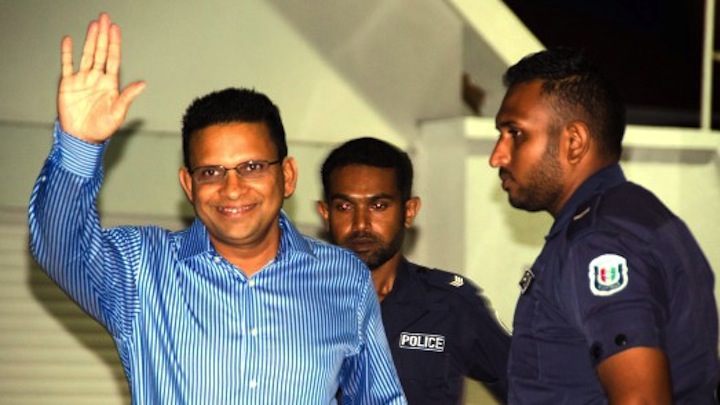The High Court has decided to summon defence witnesses on behalf of ex-Defence Minister Mohamed Nazim for the retired colonel’s appeal of his 11-year jail sentence on a weapons smuggling charge.
Speaking to the press after a closed hearing this afternoon, Nazim’s lawyer Husnu Suood said the court decided to summon witnesses currently in Malé to a hearing scheduled for tomorrow. A state witness will also be summoned to testify, he added.
During Nazim’s trial in March, the criminal court had refused to call all but two of the 37 defence witnesses, claiming some were not relevant while others could not negate the prosecution’s claims.
Nazim was convicted after a rushed trial that drew widespread condemnation over apparent lack of due process. The retired colonel maintains he was framed by rogue police officers acting on the orders of then-Tourism Minister Ahmed Adeeb.
Nazim’s appeal hearings resumed on December 3 after a five-month hiatus. The appeal had stalled in June when the Supreme Court transferred two judges on the five-judge panel to a newly-created regional branch in the south.
The second of today’s hearings was closed to the public as judges deliberated on whether to accept a confidential document submitted by the state earlier this month.
At the first hearing earlier today, Suood asked the High Court to consider sentencing Nazim under the new penal code if judges decide to uphold the criminal court’s verdict.
Suood contended that the retired colonel was wrongfully prosecuted under the Contraband Act.
“The new penal code states that it should be given priority in cases where there is a contradiction in laws including the previous penal code,” the former attorney general told the court.
Under the new penal code, the punishment for weapons possession is a jail sentence not exceeding one year. Nazim would have served a one-year prison sentence by April next year.
But Assistant Prosecutor General Hussain Nashid contended that the new penal code is irrelevant in Nazim’s case as it came into force after his trial concluded.
Nashid said it was up to the appellant to prove that he did not smuggle a weapon into the Maldives. The police had discovered a pistol and three bullets in the then-defence minister’s apartment during a midnight raid.
Suood also argued that the police violated due process and acted illegally during Nazim’s arrest.
The police officer who obtained the search warrant gave the criminal court judge false information, Suood said.
The senior officer, Azmath Abdulla, had initially claimed to have personally received information, Suood noted, but had later said that Nazim’s arrest was ordered by his superiors.
Details of Nazim’s arrest were not recorded as mandated by police regulations, he continued, noting that the police SWAT team was inside Nazim’s bedroom for more than 10 minutes before the 9mm browning pistol was found.
During the first appeal hearings in June, Nazim’s lawyers highlighted several lapses in due process, including the criminal court’s refusal to call defence witnesses, discrepancies in testimony by anonymous police officers, and the police’s alleged failure to follow the law and standard procedures in the midnight raid.
The human rights watchdog had also questioned police conduct during the 3:00am raid. The failure to videotape the raid “raises questions about the actions of police officers,” the Human Rights Commission of Maldives had said in July.
Following an inquiry to determine whether Nazim’s human rights were violated, the HRCM had found that the police acted in accordance with the law, but questioned the decision not to seek assistance from the military despite suspecting that Nazim possessed dangerous weapons and an improvised explosive device.
The police told the HRCM investigators that Nazim’s apartment was not raided based on intelligence information.
The decision was made by senior officers based on information from a credible source, according to statements from anonymised police officers.
Some police officers involved in the operation said they did not know who ordered the raid and some were unaware of the target when they prepared for the operation.
A SWAT team officer said he only knew it was Nazim’s apartment upon seeing the defence minister inside.
The police said they also found a pen drive with documents detailing a plot to assassinate President Abdulla Yameen.
The documents were presented at a closed hearing during the criminal court trial to demonstrate the former defence minister had a motive in smuggling the pistol.
Nazim’s family had previously said “there is no hope for a fair trial” due to a “notoriously politicised judiciary,” claiming he had “fallen foul of a political conspiracy, one in which powerful forces within the government have sought to destroy him and prevent him from challenging the leadership of the ruling party.”




















